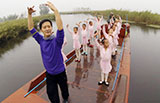WHO Weibo campaign teaches importance of infant's 'First Embrace'
By Shan Juan (chinadaily.com.cn) Updated: 2015-11-05 18:54More than 150,000 infants die at birth each year in China. WHO China is launching a new social media campaign to raise awareness of the 'First Embrace' – the skin-to-skin contact between mother and baby immediately after birth, which helps reduce the chance of infant death.
The First Embrace approach is central to the package of Early Essential Newborn Care interventions which WHO has developed to help reduce newborn deaths across the Western Pacific region including China.
This package of measures focuses on the critical first 24 hours of a child's life – the period which is responsible for almost half of all deaths within the first month of life.
Bernhard Schwartländer, WHO Representative in China said, "As many as two-thirds of newborn deaths could be prevented using simple, low-cost interventions, including the First Embrace."
According to him, the campaign has now been launched via Weibo. WHO will be posting information about the First Embrace campaign and Early Essential Newborn Care, as well as hosting online Q&A sessions on maternity and newborn nursing with Chinese and international experts.
The public can participate by following WHO on Weibo and joining the conversation.
"We are targeting new mothers and parents, pregnant women and their families, and couples in China who are thinking about having a baby," he said.
It also aims to engage health professionals in the conversation about the importance of early essential newborn care including the ‘First Embrace’, and encourages them to promote and adapt it, he added.
Statistics from the National Health and Family Planning Commission showed that newborn deaths still account for over half of current child mortality. Leadings causes include infections, premature delivery, and asphyxia.
Zhang Shuyi, a researcher at the Capital Institute of Pediatrics, a children's hospital in Beijing, said there was compelling evidence about the effectiveness of the ‘First Embrace’ approach, as part of one of the first crucial steps in early essential newborn care.
When babies are cold they are more likely to bleed, develop infections or have difficulty breathing, she explained.
Skin-to-skin contact keeps a baby warm by transferring heat, provides direct protection against infection, promotes bonding between the parent and child and supports breastfeeding.
Health workers who shifted from the normal practice of separation to sustained skin-to-skin contact have observed that babies are more pink, calm and comfortable.
Schwartländer agreed, adding that it is a simple act of love which can also build the special life-long bond between mother and child.
In China, "the benefits of this progress, however, have not been shared evenly. Just last week, new research was published which shows that child and maternal health outcomes in Shanghai rival those in the USA and Canada; in other parts of China, the statistics look more like those of poor countries such as Bangladesh," he noted.
The messages conveyed by the campaign can help to bridge the gap, he said.
- China-Vietnam border major channel for drug smugglers
- China to speed up restructuring of zombie SOEs
- Singapore plays positive role in ties between mainland and Taiwan
- Success of Fox Hunt campaign continues
- SOE changes aim to improve efficiency
- Major farm reform on the horizon
- Deadline set for hukou revisions
- Tibetans weave faith into music
- Xi-Ma meet to lead cross-Strait high-level exchanges
- English skills slip in China: survey







